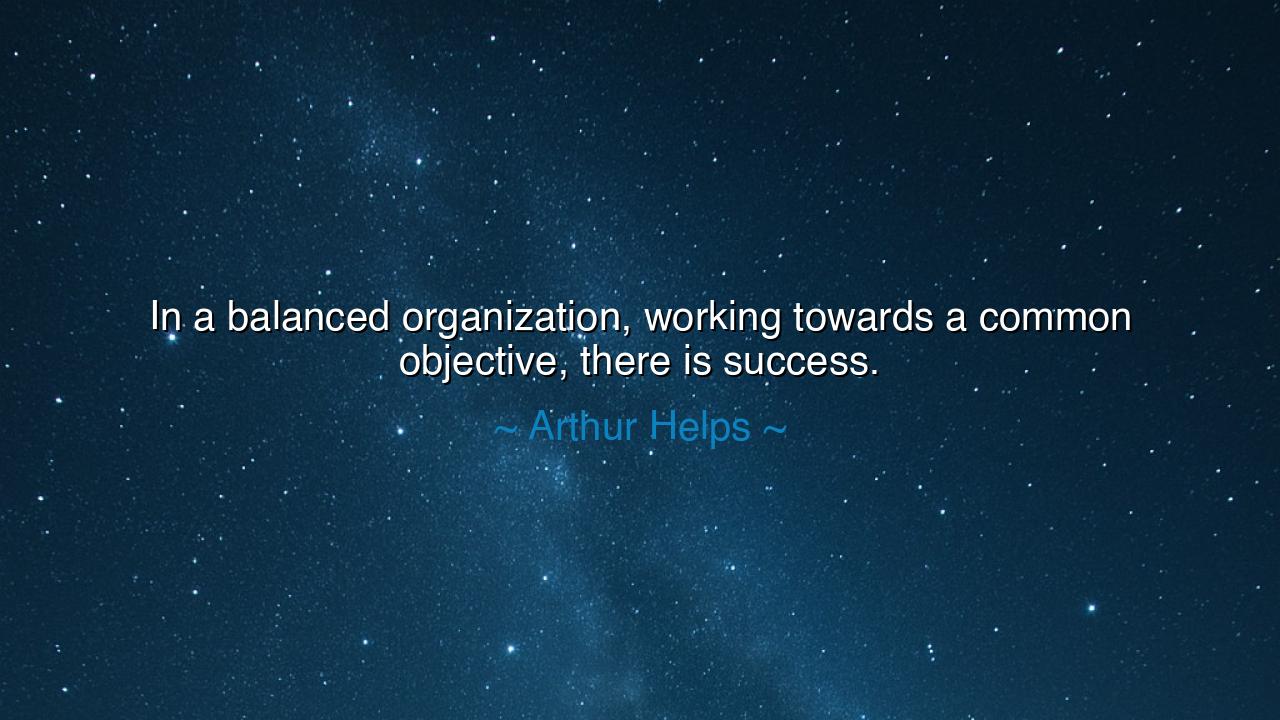
In a balanced organization, working towards a common objective






Arthur Helps, the English writer and thinker, once spoke with clarity about the secret of collective achievement: “In a balanced organization, working towards a common objective, there is success.” These words may appear plain, yet within them lies the wisdom of nations, the truth that harmony among individuals is the root of all lasting triumph. For success is not born of disorder, nor of selfish striving, but of balance, unity, and purpose shared by many hearts as though they were one.
To speak of a balanced organization is to speak of order, of each part fulfilling its role without excess or neglect. Just as the human body flourishes when all its members are in health, so too does an organization thrive when its pieces are aligned. The leader guides without tyranny, the worker labors without despair, the visionary dreams without losing sight of reality. Balance is the harmony of many forces—when ambition does not devour, when caution does not paralyze, when the parts act not in rivalry, but in concert.
The second key is the common objective. A thousand men may row a ship, but if each pulls in a different direction, the vessel turns in circles until it sinks. Yet if all row together, guided by one star, even the smallest craft can cross the mightiest seas. Helps reminds us that unity of aim transforms weakness into strength. Without a shared purpose, even the strongest organization collapses; with it, even the humblest becomes formidable.
Consider the story of the Roman legions. Their strength did not lie solely in their weapons or numbers, but in their discipline and balance. Each soldier knew his place, each cohort its task. They moved as one body, each part sacrificing for the common victory. With this balance and unity of objective, Rome extended its power across the world and endured for centuries. Their legacy is proof of Helps’ wisdom: success is born where men are bound by order and a common goal.
Another example shines in the modern age: the building of NASA’s Apollo program. Scientists, engineers, astronauts, and laborers worked together in harmony, each playing a vital role. No single genius could have placed a man on the moon; it was the balance of many disciplines and the unity of one objective—"We choose to go to the moon"—that achieved the impossible. It was not only a triumph of science, but of organization, of balance, and of shared purpose.
The lesson, then, is clear: if you would achieve great things, seek balance within your company, your family, your community. Let no single part dominate to the ruin of the rest, and let all unite in one noble aim. Beware the poison of division, for it shatters even the strongest. Cherish harmony, for it multiplies even the weakest. Success is not the gift of the powerful, but the fruit of unity.
So, O seekers of the future, take this wisdom to heart: wherever you labor, work not as one alone, but as part of a greater whole. Align your efforts with others, balance your strengths with theirs, and pursue together a common purpose worthy of your striving. For in such balance, and in such unity, you shall find not only success, but the deeper triumph of shared accomplishment.
Thus remember always: success is not the crown of the solitary, but the chorus of the united. Where balance rules and a common objective guides, no force on earth can hinder victory.






AAdministratorAdministrator
Welcome, honored guests. Please leave a comment, we will respond soon